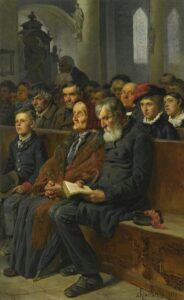
A Reflection on Psalm 80:1-7
“In the fullness of time, put all things in subjection under your Christ, and bring us with all your saints into the joy of your heavenly kingdom, where we shall see our Lord face to face.” —2019 BCP page 134
“O God, by the leading of a star you manifested your only Son to the peoples of the earth: Lead us, who know you now by faith, to your presence, where we may see your glory face to face.” —Collect for Epiphany BCP page 601
“The Lord bless you and keep you; the Lord make his face to shine upon you and be gracious unto you; the Lord lift up his countenance upon you and give you peace.” —The Aaronic Blessing, Numbers 6:24-26

In a Church – Alexei Kivshenko, 1881.
Oil on canvas © Sotheby’s London, sold June 2015.
Public domain.
The situation in Psalm 80 is bad, very bad. Israel, God’s chosen people, felt abandoned. They knew they were to be “a light to enlighten the Gentiles” and that this was part of their calling from the beginning even from the call of Abraham. And now, rather than being a light to the Gentiles, they had become the laughing stock of the nations. The Lord God who was to be their shepherd and protect them had turned his back on them and had actually allowed the nations symbolized by the wild boar of Psalm 80:13 to come and ravage the nation. To make matters worse, they knew that they deserved it because they had lost their love for God and chased after other gods. Historians believe this Psalm was most likely written between the fall of the northern kingdom to the Assyrians and the fall of Judah to the Babylonians. Kings were slain, the very walls of Jerusalem were to crumble. And yet this psalm is not totally depressing. It is a cry to God, the shepherd of Israel, to once again return and restore their lives. The constant refrain of the Psalm in verses 3,7, and 19 is that if only God would turn his face to them once again, if only Israel could see his countenance, then they would be restored and even find salvation. And so this is the psalm for the fourth Sunday of Advent. We are in the midst of winter, during the darkest time of the year, the world is full of darkness and evil, and the church cries out, “Restore us, O God of hosts; let your face shine, that we might be saved!” Christmas was the answer to that cry and that prayer. The Good Shepherd was born in Bethlehem, and the light of God pierced the darkness and the face of God, shone in the face of the baby in the manger. The true light, which enlightens everyone, was coming into the world…and to all who received him and believed in his name, he gave the right to become the children of God.” —John 1:9-12The good news, the Gospel is that the Father heard our prayers and answered them beyond our wildest imaginations. The bad news is that even though the light and glory of God shone in the face of Jesus, many would still not receive him and believe in his name. And so the snows fell again. Winter came again. And a broken humanity cries once again to God, “Restore us and save us, show us the light of your countenance once again!” To which those of us who have not lost hope and who have read the Scriptures cry out, “Maranatha!” And Jesus responds, “Surely I am coming soon.” —Revelation 22:20
And the sheep of his pasture reply, “Amen! Come, Lord Jesus!”
O come, let us adore him!
†Bishop Mark
